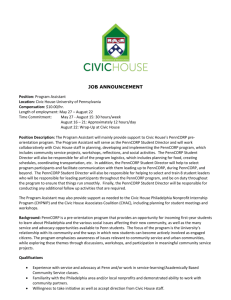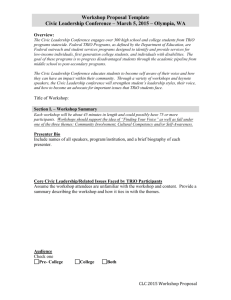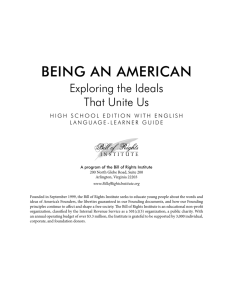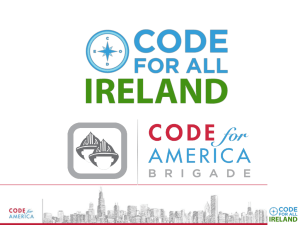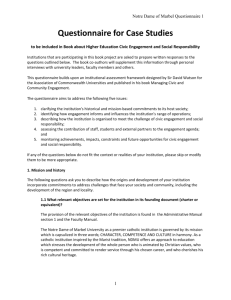Notre Dame of Marbel University, Philippines
advertisement
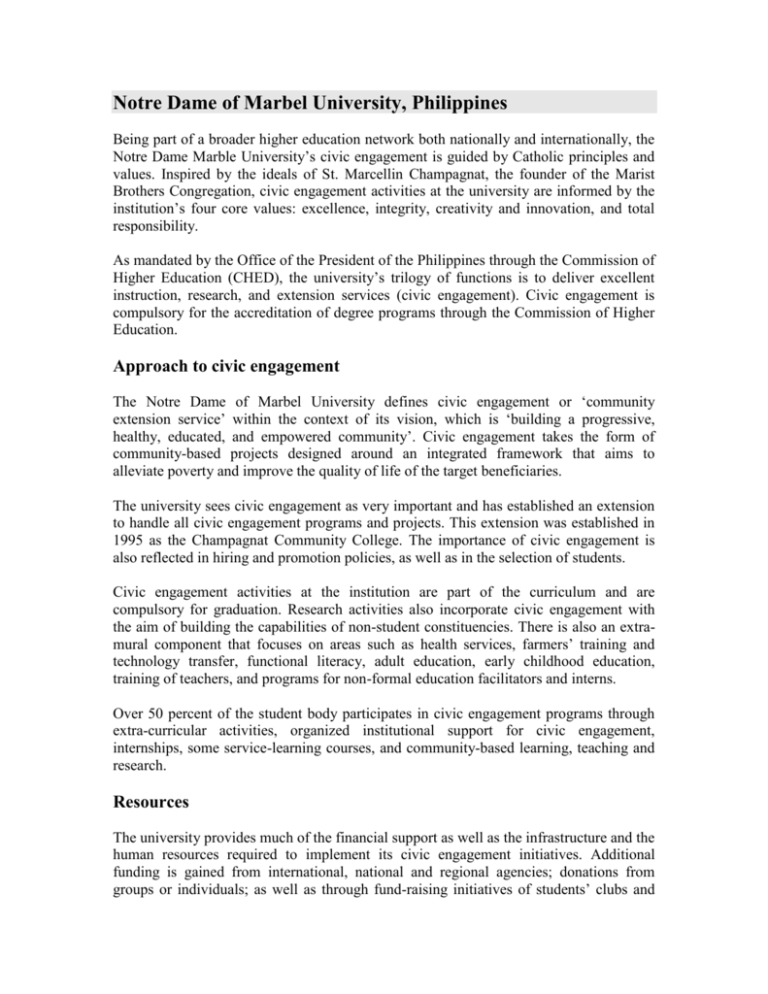
Notre Dame of Marbel University, Philippines Being part of a broader higher education network both nationally and internationally, the Notre Dame Marble University’s civic engagement is guided by Catholic principles and values. Inspired by the ideals of St. Marcellin Champagnat, the founder of the Marist Brothers Congregation, civic engagement activities at the university are informed by the institution’s four core values: excellence, integrity, creativity and innovation, and total responsibility. As mandated by the Office of the President of the Philippines through the Commission of Higher Education (CHED), the university’s trilogy of functions is to deliver excellent instruction, research, and extension services (civic engagement). Civic engagement is compulsory for the accreditation of degree programs through the Commission of Higher Education. Approach to civic engagement The Notre Dame of Marbel University defines civic engagement or ‘community extension service’ within the context of its vision, which is ‘building a progressive, healthy, educated, and empowered community’. Civic engagement takes the form of community-based projects designed around an integrated framework that aims to alleviate poverty and improve the quality of life of the target beneficiaries. The university sees civic engagement as very important and has established an extension to handle all civic engagement programs and projects. This extension was established in 1995 as the Champagnat Community College. The importance of civic engagement is also reflected in hiring and promotion policies, as well as in the selection of students. Civic engagement activities at the institution are part of the curriculum and are compulsory for graduation. Research activities also incorporate civic engagement with the aim of building the capabilities of non-student constituencies. There is also an extramural component that focuses on areas such as health services, farmers’ training and technology transfer, functional literacy, adult education, early childhood education, training of teachers, and programs for non-formal education facilitators and interns. Over 50 percent of the student body participates in civic engagement programs through extra-curricular activities, organized institutional support for civic engagement, internships, some service-learning courses, and community-based learning, teaching and research. Resources The university provides much of the financial support as well as the infrastructure and the human resources required to implement its civic engagement initiatives. Additional funding is gained from international, national and regional agencies; donations from groups or individuals; as well as through fund-raising initiatives of students’ clubs and organizations. Government departments such as health, education, social welfare and development, and the department of agriculture have also partnered with the university to offer resource support. Challenges The university faces some challenges in the execution of its civic engagement programs. Being a faith-based institution, it faces some difficulty in taking up issues such as family planning and biotechnology since these may contradict the values and teachings of the Catholic Church. There are few incentives for higher education institutions to be involved in social development, and political instability in the Philippines hampers the work that the university would like to be doing. Other challenges include the distant location of project sites, and time constraints faced by students and faculty owing to a heavy academic workload. Conclusion In response to a need to continue expanding its civic engagement activities, the university sees itself playing a major role in the Philippines through its affiliation network. Consequently, it intends to coordinate and collaborate with the coalition of nongovernmental organizations, organize training courses, workshops, seminars and conferences, initiate advocacy in the local and regional levels, and offer short-term courses to participants. Community Program Health Integrated Lifelong Development (CHILD) Four years ago, the Notre Dame of Marbel University initiated the CHILD Program among the T’boli people, an indigenous tribe of South Cotabato, Mindanao and Philippines. The program’s key participants are children aged between 6 and 12 years, their parents, and the people of T’boli, Lake Sebu and Alon, South Cotabato, Mindanao and Philippines. It aims to instill self-determination and empowerment in indigenous people through the promotion and preservation of their cultural beliefs and practices, the formation and clarification of values, capacity building, and access to resources necessary for basic and social needs. To date the program has assisted over 200 T’boli children. Since inception, the CHILD Program has successfully sourced partners and established relationships with various government departments, local government units, and people’s organizations. The program has helped indigenous children acquire basic education and has established a community-based Learning Resource Center to make available informative materials such as books and magazines. It has sought to develop sportsmanship among the children, and has distributed sports materials and equipment. Training in values formation and life skills is conducted under the supervision of parents, teachers, volunteers from the university, and Champagnat Community College staff. Through the program, the university has stimulated the increased involvement of women in decisionmaking, and has fostered their livelihood and health programs. It is the university’s belief that nation-building and large-scale development are strongly dependent on development at the grassroots level, which is why it focuses its civic engagement efforts on the development of poor communities. At a glance Name of institution Country Type of institution Total number of undergraduate students in 2005 Total number of graduate students in 2005 Extent of students participating in civic engagement activities Extent of faculty participating in civic engagement activities Notre Dame of Marbel University Philippines Private 5,825 345 50-75% 50-75% National, regional and international affiliations Association of Non-Traditional Education in the Philippines Bureau of Non-Formal Education, Department of Education International Affairs Service, Commission of Higher Education Catholic Educational Association of the Philippines Association of Catholic Universities in the Philippines Foundation for Upgrading the Standard of Education Regional Science Teaching Centre, Department of Science and Technology Center for Industrial Technology Expertise Synergia Foundation Network


